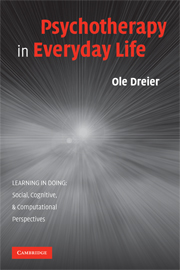Book contents
- Frontmatter
- Contents
- Series Foreword
- Preface
- Introduction
- 1 Re-Searching Psychotherapy as a Social Practice
- 2 Theorizing Persons in Structures of Social Practice
- 3 A Study – Its Design and Conduct
- 4 Clients' Ordinary Lives Plus Sessions
- 5 Therapy in Clients' Social Practice across Places
- 6 Changes in Clients' Practice across Places
- 7 Changing Problems across Places
- 8 The Conduct of Everyday Life and the Life Trajectory
- 9 The Children's Changing Conducts of Everyday Life and Life Trajectories
- 10 The Parents' Changing Conducts of Everyday Life and Life Trajectories
- 11 The Changing Conduct of Everyday Family Life and Family Trajectory
- 12 Research in Social Practice
- References
- Author Index
- Subject Index
- Learning in Doing: Social, Cognitive, and Computational Perspectives
3 - A Study – Its Design and Conduct
Published online by Cambridge University Press: 15 December 2009
- Frontmatter
- Contents
- Series Foreword
- Preface
- Introduction
- 1 Re-Searching Psychotherapy as a Social Practice
- 2 Theorizing Persons in Structures of Social Practice
- 3 A Study – Its Design and Conduct
- 4 Clients' Ordinary Lives Plus Sessions
- 5 Therapy in Clients' Social Practice across Places
- 6 Changes in Clients' Practice across Places
- 7 Changing Problems across Places
- 8 The Conduct of Everyday Life and the Life Trajectory
- 9 The Children's Changing Conducts of Everyday Life and Life Trajectories
- 10 The Parents' Changing Conducts of Everyday Life and Life Trajectories
- 11 The Changing Conduct of Everyday Family Life and Family Trajectory
- 12 Research in Social Practice
- References
- Author Index
- Subject Index
- Learning in Doing: Social, Cognitive, and Computational Perspectives
Summary
My project studied persons in social practice by re-searching psychotherapy as a social practice. In a small number of family therapy cases, I looked into the links between the clients' perspectives and activities in their ordinary everyday lives and their sessions. This study throws new light on the way therapy works and on the dynamics of change as clients see it and act on it. It also contributes to a more complete and grounded understanding of client problems and therapy that may be used to develop current practice.
The Unit of Outpatient Child Psychiatry and the Project
The project took place in an outpatient child psychiatry unit at a hospital in Copenhagen. Other divisions in the hospital, general practitioners, school psychologists, consultant psychologists in kindergartens, and agencies in the social sector refer children, and often their families, to the unit. It is not a frontline unit but one that offers treatment in particular cases which the frontline units cannot handle. So, mostly other professionals have already worked on the problems that led to the referral. Headed by a psychiatrist, the staff also includes a chief psychologist, training positions for a psychiatrist and a psychologist, two social workers, a specially trained pedagogue, and secretaries. The project builds on my prior collaboration with the unit. While it is carried out, it is an extra activity that is given a particular place and integrated into the ongoing practice of the unit (Dreier 1996).
- Type
- Chapter
- Information
- Psychotherapy in Everyday Life , pp. 47 - 57Publisher: Cambridge University PressPrint publication year: 2007



